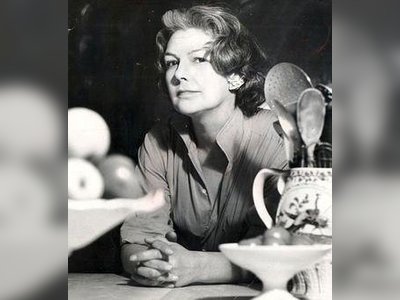British Heritage
Remember, Cherish, Learn.
beta
William Sitwell
Champion of the British Culinary Critique Tradition.
With a name synonymous with the upper echelons of British culture and history, William Sitwell has carried the prestigious Sitwell family banner into the culinary sphere with considerable élan. Known for his incisive commentary, engaging writings, and deep appreciation of British culinary heritage, Sitwell has forged a name for himself as an authoritative critic, acclaimed author, and charismatic broadcaster. His work, reaching far beyond the traditional boundaries of food journalism, has made him an indispensable figure in contemporary British gastronomy.
Born on 2 October 1969, William Ronald Sacheverell Sitwell belongs to the renowned Sitwell family, a lineage rich in writers and critics. He is the grandson of critic Sir Sacheverell Sitwell, 6th Baronet, and the great-nephew of writer Sir Osbert Sitwell, 5th Baronet, and poet Dame Edith Sitwell. As the heir presumptive to the Sitwell Baronetcy, currently held by his elder brother, Sir George Sitwell, 8th Baronet, William carries a legacy deeply interwoven with Britain's cultural heritage.
Educated at Eton College and the University of Kent, Sitwell's early inclinations towards writing were evident. He honed his journalistic flair writing for the student newspaper, laying the groundwork for his future career as a writer and critic.
Sitwell's foray into the culinary world has been marked by his multifaceted roles as a restaurant critic, editor, broadcaster, and author. A familiar figure on the British culinary scene, he is known for his appearances on MasterChef UK as a quarter-final judge, where he sets the challenge for one group of quarter-finalists and joins John Torode and Gregg Wallace as a judge.
His tenure as editor of Waitrose Food solidified his status as a leading voice in Britain's food culture. However, he gained wider recognition and international acclaim with his engaging, insightful books on food. Works such as "Eggs or Anarchy: The Remarkable Story of the Man Tasked with the Impossible: to Feed a Nation at War" (2016), "A History of Food in 100 Recipes" (2017), "The Really Quite Good British Cookbook" (2017), and "The Restaurant: A 2,000-Year History of Dining Out" (2020), have cemented his reputation as a writer and historian of food.
Sitwell's journey hasn't been without controversy. He made headlines in 2018 when he resigned from his role as editor of Waitrose Food over an email exchange about vegan-friendly recipes that was perceived as offensive by some. Despite the controversy and subsequent departure from Waitrose Food, Sitwell demonstrated resilience. He apologised for the incident and continued his work as a food critic for The Daily Telegraph, further enhancing his standing in the industry.
In 2019, another controversy unfolded when Sitwell reported receiving threatening calls from a restaurant he had reviewed in The Daily Telegraph. A complaint lodged with the Independent Press Standards Organisation (IPSO) by the restaurant in question was ultimately dismissed, vindicating Sitwell's account.
Despite the occasional tumult, Sitwell's contributions to British gastronomy are undeniable. His writings and critical reviews offer a blend of historical depth, culinary insight, and wittiness, reflecting the Sitwell tradition of cultural critique. He has helped shape modern British food culture by championing excellence, authenticity, and innovation.
As host of "William Sitwell's Supper Club" in partnership with The Daily Telegraph, Sitwell continues to cultivate a community of food enthusiasts, spotlighting the vibrant, diverse facets of Britain's gastronomic scene. His work, imbued with the unique perspective of a culinary historian, prolific writer, and passionate food lover, underscores his significant role in Britain's culinary tradition.
In essence, William Sitwell represents the fusion of Britain's deep-rooted literary and cultural heritage with the nation's evolving culinary landscape. His contribution to British heritage is multifaceted, combining critical acumen, an innate appreciation for culinary arts, and a commitment to sharing his passion with the broader public. Through his ongoing work, Sitwell upholds and enriches the British tradition of culinary critique, leaving an indelible imprint on the nation's gastronomic heritage.
An Illustrious Lineage and Early Career
Born on 2 October 1969, William Ronald Sacheverell Sitwell belongs to the renowned Sitwell family, a lineage rich in writers and critics. He is the grandson of critic Sir Sacheverell Sitwell, 6th Baronet, and the great-nephew of writer Sir Osbert Sitwell, 5th Baronet, and poet Dame Edith Sitwell. As the heir presumptive to the Sitwell Baronetcy, currently held by his elder brother, Sir George Sitwell, 8th Baronet, William carries a legacy deeply interwoven with Britain's cultural heritage.
Educated at Eton College and the University of Kent, Sitwell's early inclinations towards writing were evident. He honed his journalistic flair writing for the student newspaper, laying the groundwork for his future career as a writer and critic.
Establishing a Reputation: Food Writing and Broadcasting
Sitwell's foray into the culinary world has been marked by his multifaceted roles as a restaurant critic, editor, broadcaster, and author. A familiar figure on the British culinary scene, he is known for his appearances on MasterChef UK as a quarter-final judge, where he sets the challenge for one group of quarter-finalists and joins John Torode and Gregg Wallace as a judge.
His tenure as editor of Waitrose Food solidified his status as a leading voice in Britain's food culture. However, he gained wider recognition and international acclaim with his engaging, insightful books on food. Works such as "Eggs or Anarchy: The Remarkable Story of the Man Tasked with the Impossible: to Feed a Nation at War" (2016), "A History of Food in 100 Recipes" (2017), "The Really Quite Good British Cookbook" (2017), and "The Restaurant: A 2,000-Year History of Dining Out" (2020), have cemented his reputation as a writer and historian of food.
Controversies and Resilience
Sitwell's journey hasn't been without controversy. He made headlines in 2018 when he resigned from his role as editor of Waitrose Food over an email exchange about vegan-friendly recipes that was perceived as offensive by some. Despite the controversy and subsequent departure from Waitrose Food, Sitwell demonstrated resilience. He apologised for the incident and continued his work as a food critic for The Daily Telegraph, further enhancing his standing in the industry.
In 2019, another controversy unfolded when Sitwell reported receiving threatening calls from a restaurant he had reviewed in The Daily Telegraph. A complaint lodged with the Independent Press Standards Organisation (IPSO) by the restaurant in question was ultimately dismissed, vindicating Sitwell's account.
An Undeniable Legacy
Despite the occasional tumult, Sitwell's contributions to British gastronomy are undeniable. His writings and critical reviews offer a blend of historical depth, culinary insight, and wittiness, reflecting the Sitwell tradition of cultural critique. He has helped shape modern British food culture by championing excellence, authenticity, and innovation.
As host of "William Sitwell's Supper Club" in partnership with The Daily Telegraph, Sitwell continues to cultivate a community of food enthusiasts, spotlighting the vibrant, diverse facets of Britain's gastronomic scene. His work, imbued with the unique perspective of a culinary historian, prolific writer, and passionate food lover, underscores his significant role in Britain's culinary tradition.
In essence, William Sitwell represents the fusion of Britain's deep-rooted literary and cultural heritage with the nation's evolving culinary landscape. His contribution to British heritage is multifaceted, combining critical acumen, an innate appreciation for culinary arts, and a commitment to sharing his passion with the broader public. Through his ongoing work, Sitwell upholds and enriches the British tradition of culinary critique, leaving an indelible imprint on the nation's gastronomic heritage.
- William Sitwellen.wikipedia.org


